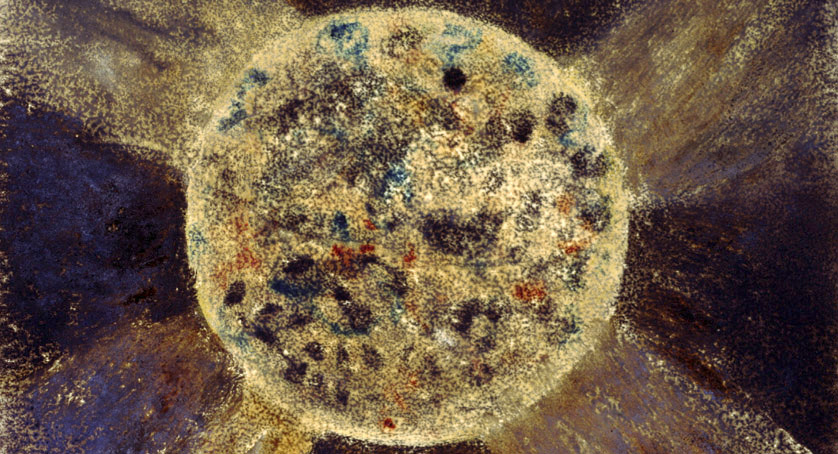Romantic Worlding

Summary
In his letters and journals Johann Wolfgang von Goethe conceived of world literature as a dynamic process of exchange that would enable cultures to be regenerated through a process of mirroring and critique, while also providing a means of moving towards intercultural understanding and universal tolerance via the bridging of differences. It is this notion of literature as a force of change that some have seen as missing from current approaches to world literature, most of which (Damrosch, Moretti, and Apter for example) imagine the world as a surface across which literatures circulate and capital’s global expansion can be made visible. In contrast, this project recasts the relation between world and literature as one in which the dynamic force of the latter has the potential to open new worlds that can resist and subvert the capitalist expansions that world literature studies generally takes as given.
Following Betty Joseph’s suggestion that, during the long eighteenth century, the notion of world-becoming emerges as a distinguishing feature of modernity, Romantic Worlding examines the ways in which Romantic refigurations of space-time as layered, plastic, circular, or overlapping, as simultaneously material and spiritual, contextual and expansive, can be seen as attempts to engage with forms of worlding that disrupt the easy universality of Enlightenment and now globalisation. Thomas De Quincey’s attempts to unify a heterogenous world, for example, were increasingly countered by proliferating forms of difference, represented in particular by the spatio-temporal mechanics of his palimpsestic layerings. Conversely, in the work of Percy Shelley, literary transmission and imaginative engagement are presented as forms of transnational dialogue that open worlds to difference and thus to a modern politics. And far more radically, William Blake’s entire oeuvre resists the institutionalisation of a single world, by presenting the conflict between contraries as able to open new worlds in all their plurality and difference from things as they are.
Rather than a bounded object in Mercatorian space, the globe traversed by these writers exceeds regimes of equivalence, becoming a space open to new forms of exchange via an attentiveness to possible beginnings and the emergence of new forms. This dynamic space provides the touchstone for Romantic Worlding, which examines the ways in which De Quincey, Shelley, and Blake give us forms of worlding that either attest to, disrupt, or simply refuse a generalised translatability between worlds. It asks after the consequences, political, social, and ethical, of refiguring our world/s as either imbricated transmission, palimpsestic layering, or machinic assemblage, in order to ascertain how we might conceive the role of literature within a world as an active force rather than a mere commodity of exchange.
Investigator
Dr Phil Habil Jennifer Wawrzinek, Freie Universität Berlin
Contact
Email: j.wawrzinek@fu-berlin.de
Themes related to this project
Research projects
- Architectures of Imagination: Bodies, Buildings, Fictions, and Worlds
- Azuchi Screens Research Network
- Beyond Identity: Romanticism and Decreation
- British Romanticism and colonial modernity in India, 1780-1840
- Climate Science Denialism and its populist Analogs
- Critique, Creativity, Innovation
- Extremism and the Australian Imaginary
- Gothic Fictions: Emotion, Contagion, and the Transformation of Experience in Modernity
- Human Kind: transforming identity in Australian and British portraits 1700-1900
- Islam and the Left in Indonesia and Turkey
- Kenzaburo Ōe and William Blake: Modernity, Romanticism, Japan
- Literary Romanticism and the Media of Romantic Love
- Natural Born Subjects: A Cultural History of Naturalization in Britain and the Australian Colonies, 1660-1850
- New tastemakers and Australia's post-digital literary culture
- Observation and Analogy in Enlightenment and Romantic Natural History
- Reconstructing museum specimen data through the pathways of global commerce
- Regency Flash: Britain, Ireland and Australia, 1788-1848
- Romantic Worlding
- The Butterfly Men of Kuranda: natural history dealers in the 'deep north'
- The George Lyell Collection
- The Past and Present of Sugar
- The Pasts and Futures of Virtual Reality
- Theorising the online anti-public sphere
- War-Widow, Mother, Slave, Refugee: Andromache in Romantic Europe
- William Blake and the History of Imagination: Poetry, Prophecy, and Secularization
- World Literatures, Theatres and Cultures research network